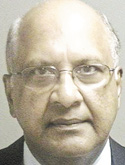A former Mahoning County official accused of being involved in the Oakhill conspiracy case won’t be charged


Zachariah
CLEVELAND
Prosecutors in the Oakhill Renaissance Place criminal conspiracy case contend John Zachariah committed various illegal activities, but will never prosecute the former Mahoning County Job and Family Services director.
That’s because the statute of limitations on charging Zachariah expired before the most recent set of indictments.
A Cuyahoga County grand jury on May 15, 2014, indicted three others: Youngstown Mayor John A. McNally in his previous capacity as a Mahoning County commissioner, Mahoning County Auditor Michael V. Sciortino and attorney Martin Yavorcik, a failed 2008 county prosecutor candidate.
Zachariah’s statute of limitations expired in early April 2014.
McNally, Sciortino and Yavorcik have pleaded not guilty to the 83 counts that include engaging in a pattern of corrupt activity, bribery, perjury, conspiracy, money laundering and tampering with records.
The indictment charges the three, and lists numerous others — including Zachariah by name — as being part of a criminal enterprise to impede the move of the county JFS from the Cafaro Co.-owned Garland Plaza on the East Side to Oakhill Renaissance Place, the former Forum Health Southside Medical Center.
The statute of limitations for charging someone with felony counts of bribery, perjury, conspiracy and tampering with records is six years after they allegedly occur, said Dan Tierney, spokesman for the Ohio Attorney General’s Office, which is prosecuting this case with the Cuyahoga County Prosecutor’s Office.
The statute for misdemeanors, he said, is two years after they allegedly occur.
There are two exceptions to the statute of limitations in public corruption cases, said Tierney, who spoke in general terms about the law and declined to specifically discuss Zachariah or the Oakhill case.
If a felony is alleged to have been committed by a public officeholder related to that public office, the six-year statute is extended two years after they leave office, he said.
Also, if fraud was committed and not discovered until later, the clock ticks on the statute of limitations from the point of that discovery, Tierney said.
If a person is indicted, time doesn’t toll until the indictment is resolved, Tierney said.
Zachariah, Anthony Cafaro Sr., McNally, Sciortino, Yavorcik and others previously were indicted July 29, 2010. Zachariah was charged with a count of engaging in a pattern of corrupt activity, two counts of conspiracy, three counts of perjury, and one count each of bribery and tampering with records.
The case was dismissed July 11, 2011, with prosecutors having the right to file charges again.
Zachariah resigned as head of JFS on March 2, 2007, and was deposed in a case related to the agency a month later.
Taking into account the nearly one year he was under indictment, Zachariah’s six-year statute of limitations expired in early April 2014.
The May 2014 indictment alleges that McNally and Sciortino, both Democrats, received benefits for opposing the relocation, and Yavorcik, an independent, accepted money in exchange for agreeing not to investigate or prosecute members of the enterprise if elected prosecutor.
A “notice of intent to use evidence” document, filed last week by prosecutors, outlines what they contend was coordinated corruption between Cafaro, the former head of his family’s retail-development company, and certain county officials, including Zachariah.
The May 2014 indictment contends Zachariah accepted benefits, including money and about $30,000 in legal fees, from Businessman 1, who last week’s filing shows to be Cafaro. That indictment also accuses Zachariah of tampering with government records by “creating false or misleading records to inflate the cost of moving” JFS from Garland to Oakhill, and that he allegedly perjured himself or made false statements in a civil court deposition.
In a deposition, Cafaro under oath said neither he nor the Cafaro Co. paid Zachariah’s attorney fees, but last week’s filing said there are records provided by the Cafaro Co. that show the company paid those legal fees.
Days before his Feb. 15, 2007, resignation announcement, Zachariah emailed Cafaro “seeking help to obtain a job,” according to the filing. Among the evidence listed is a copy of a check for $486 from Cafaro to pay for food and a receipt for $153 for drinks for Zachariah’s “going-away party.”
 43
43
